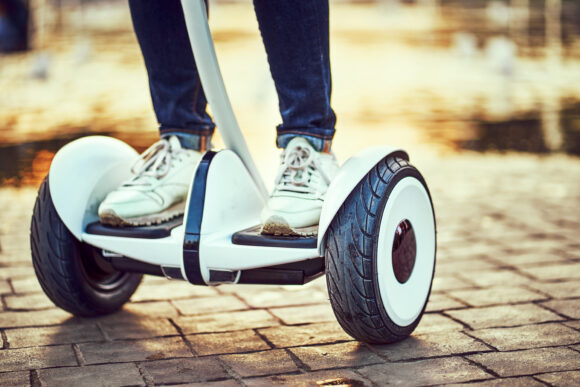A man injured when he was hit by a car while he was operating a low speed Segway electric scooter is not entitled to personal injury protection (PIP) benefits under New Jersey’s no-fault auto insurance law, the state’s Supreme Court has ruled.
David Goyco had argued that he was entitled to PIP benefits from his auto insurer Progressive Insurance because, he claimed, his low speed electric scooter (LSES) was akin to a bicycle, bicyclists have been deemed pedestrians, and pedestrians are entitled to benefits under the no-fault act.
But the New Jersey Supreme Court has rejected Goyco’s arguments, as did lower courts. Instead, the high court found that the plain language of the no-fault law makes Goyco ineligible for no-fault PIP benefits.
“Expanding the definition of “pedestrian” to include LSES operators would be a policy decision with insurance cost implications that is properly for the Legislature, not the Court,” the unanimous opinion states.
In November 2021, Goyco was operating a Segway scooter that has a maximum speed of 15 mph when he was struck by an automobile. As a result of the accident, he sustained injuries and incurred medical expenses for his treatments. He filed for PIP benefits.
Progressive denied his claim, informing him he was ineligible for PIP benefits because no-fault benefits are only available if the accident involves a qualifying automobile and the Segway does not meet the definition of a qualifying automobile under the law.
Progressive also explained that the Segway he was riding at the time of the accident disqualified him from meeting the definition of a pedestrian.
Goyco protested that denial but neither the trial court nor the state appeals court adopted his reasoning. Now the state Supreme Court has affirmed the appellate court’s conclusion, while noting that there was no need to go outside the language of the no fault provision itself or the “ordinary meanings” of the terms it uses to reach the same conclusion.
The no-fault act requires that every New Jersey automobile liability insurance policy provide PIP benefits when the covered individual is “occupying, entering into, alighting from or using an automobile” or when the covered individual is a “pedestrian.”
The no-fault law defines “pedestrian” as “any person who is not occupying, entering into, or alighting from a vehicle propelled by other than muscular power and designed primarily for use on highways, rails and tracks.”
First the high court found that an LSES clearly falls within the ordinary definitions of the term vehicles; therefore it is a “vehicle” for purposes of the no-fault act.
Based on the evidence, the court said Goyco’s LSES was “propelled by other than muscular power” because it used an electric motor with a rechargeable battery. Critically, Goyco’s LSES was not designed to be propelled by muscular power.
The high court further concluded that his LSES was designed for “use on highways” based on its features and the broad ordinary definition of the term “highways.” His LSES can travel 15.5 miles per hour and has a headlight, brake light, and speedometer. The LSES’s owner’s manual provides that LSES operators must “comply with local laws and regulations.”
Since his electric scooter is not propelled by muscular power and is made for use on highways, Goyco was not a pedestrian and thus is not eligible for PIP benefits.
The high court also said the separate provision — N.J.S.A. 39:4-14.16(g) — that Goyco argued meant he should be considered a pedestrian like a bicyclist does not in fact render him a pedestrian for purposes of the no-fault act.
Progressive pointed out that N.J.S.A. 39:4-14.16(g) does not apply to the no-fault act because it was implemented to combat climate change, not to expand the applicability of PIP benefits in the no- fault act.
The high court concluded that neither the plain text nor the legislative history of the law suggests that the legislature intended LSES riders to be considered pedestrians for purposes of the no-fault act. Rather, the court said, the text and legislative history suggest that LSES riders are not considered “pedestrians” for purposes of PIP benefits.
Topics Auto New Jersey
Was this article valuable?
Here are more articles you may enjoy.



 AIG’s Zaffino: Outcomes From AI Use Went From ‘Aspirational’ to ‘Beyond Expectations’
AIG’s Zaffino: Outcomes From AI Use Went From ‘Aspirational’ to ‘Beyond Expectations’  Experian Launches Insurance Marketplace App on ChatGPT
Experian Launches Insurance Marketplace App on ChatGPT  BMW Recalls Hundreds of Thousands of Cars Over Fire Risk
BMW Recalls Hundreds of Thousands of Cars Over Fire Risk  How One Fla. Insurance Agent Allegedly Used Another’s License to Swipe Commissions
How One Fla. Insurance Agent Allegedly Used Another’s License to Swipe Commissions 

